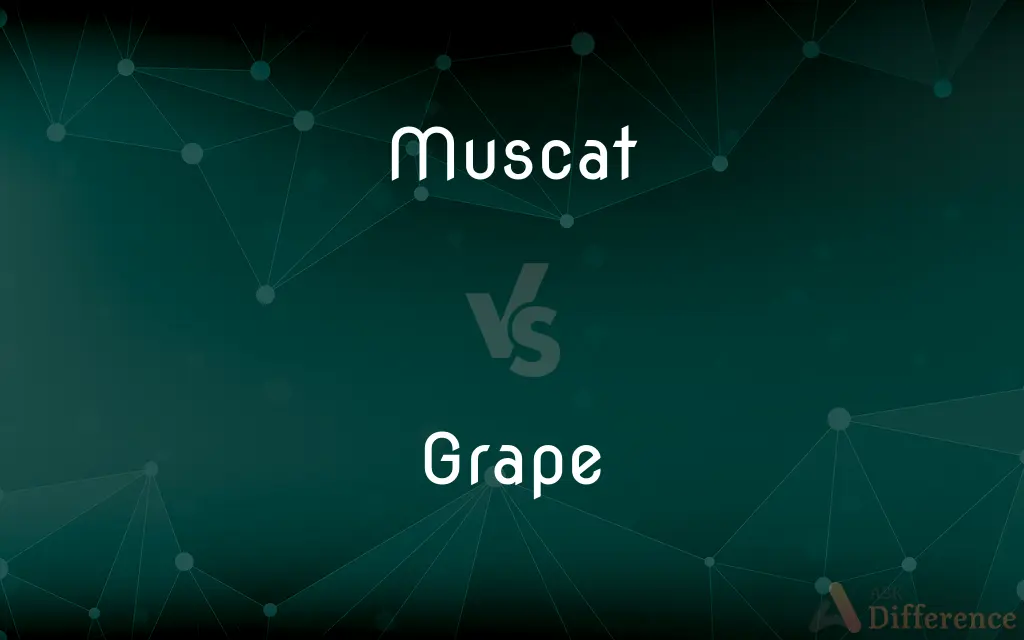Muscat vs. Grape — What's the Difference?
By Tayyaba Rehman — Updated on November 3, 2023
Muscat refers to a family of grapes with a distinct sweet aroma, while grape is a general term for berries from the Vitis genus, used for eating, juice, and winemaking.

Difference Between Muscat and Grape
Table of Contents
ADVERTISEMENT
Key Differences
Muscat is a specific variety of grape, known for its strong, sweet fragrance and is often used to make aromatic wines. Grapes, in general, come in many varieties, with flavors ranging from sweet to tart and are used for a multitude of purposes including wine-making, as fresh fruit, and for dried fruits like raisins.
The grape is a fruit of the Vitis genus that grows in clusters and can be red, green, black, purple, and even golden. Muscat grapes are typically characterized by their musky taste and are usually a white or light-colored variety, standing out among the wide spectrum of grape colors.
While all Muscats are grapes, not all grapes are Muscats. The term 'grape' encompasses a vast range of cultivars and species, including table grapes and wine grapes. Muscat grapes are particularly noted for being one of the oldest genetically unmodified vines still in existence.
In the context of wine, a Muscat typically refers to a wine that has been made from the Muscat variety of grapes and often has a sweet and fruity profile. On the other hand, wines made from other grape varieties can range vastly in flavor, from dry to sweet, still to sparkling, and light to full-bodied.
Muscat grapes are often eaten fresh or dried, but they are most famous for their role in producing Moscato wine. Grapes, on the other hand, are versatile; beyond eating and winemaking, they are also used in jams, jellies, juices, and vinegars.
ADVERTISEMENT
Comparison Chart
Definition
A grape variety with a sweet aroma.
A fruit from the Vitis genus.
Uses
Primarily for dessert wines and fresh eating.
For wine, fresh eating, raisins, juices.
Aroma
Noted for a musky and sweet aroma.
Aromas vary widely among different types.
Wine Profile
Usually sweet and fruity wines.
Ranges from dry to sweet, varied profiles.
Historical Significance
One of the oldest grape varieties.
Cultivated for thousands of years worldwide.
Compare with Definitions
Muscat
A grape used in perfumery for its aroma
The fragrance had notes of Muscat.
Grape
A small, round, juicy fruit used in wines
They harvested grapes for winemaking.
Muscat
Pertaining to the Muscat grape
They sampled a Muscat jelly.
Grape
A source for grape juice
Grape juice is her favorite breakfast drink.
Muscat
A variety of sweet grape
The vineyard specializes in Muscat grapes.
Grape
A grape is a fruit, botanically a berry, of the deciduous woody vines of the flowering plant genus Vitis. Grapes can be eaten fresh as table grapes, used for making wine, jam, grape juice, jelly, grape seed extract, vinegar, and grape seed oil, or dried as raisins, currants and sultanas.
Muscat
A sweet, fortified wine
He prefers a glass of Muscat with dessert.
Grape
Any of various woody vines of the genus Vitis, bearing clusters of edible berries and widely cultivated in many species and varieties.
Muscat
Muscat (Arabic: مَسْقَط, Masqaṭ pronounced [ˈmasqatˤ]) is the capital city and is the most populated city in Oman. It is the seat of the Governorate of Muscat.
Grape
The fleshy, smooth-skinned, purple, red, or green berry of a grape, eaten raw or dried as a raisin and widely used in winemaking.
Muscat
Any of various fragrant white, red, or black grapes, used for making wine or raisins.
Grape
A dark violet to dark grayish purple.
Muscat
Muscatel wine.
Grape
Grapeshot.
Muscat
A white grape variety; used as table grapes and for making raisins and sweet wine.
Grape
(countable) A small, round, smooth-skinned edible fruit, usually purple, red, or green, that grows in bunches on vines of genus Vitis.
Grapes give us whole-fruit snacks, grape juice, raisins, wine, and more.
Muscat
The muscatel wine made from these grapes.
Grape
A woody vine of genus Vitis that bears clusters of grapes; a grapevine.
Wild grape covering the back slope
Muscat
The vine bearing this fruit.
Grape
(countable) Any of various fruits or plants with varying resemblances to those of genus Vitis but belonging to other genera; their edibility varies.
Sea grape; tail grape
Muscat
A name given to several varieties of Old World grapes, differing in color, size, etc., but all having a somewhat musky flavor. The muscat of Alexandria is a large oval grape of a pale amber color.
Grape
A dark purplish-red colour, the colour of many grapes.
For those seeking purply tones, the paint colors available include mauve, magenta, and grape.
Muscat
Any of several cultivated grapevines that produce sweet white grapes
Grape
(uncountable) grapeshot
Men mowed down by grape
Muscat
A port on the Gulf of Oman and capital of the sultanate of Oman
Grape
A mangy tumour on a horse's leg.
Muscat
Wine from muscat grapes
Grape
A purple-shirted technician responsible for refueling aircraft.
Muscat
Sweet aromatic grape used for raisins and wine
Grape
A person's head.
Muscat
A dessert wine grape used in dried form
She topped her salad with dried Muscat grapes.
Grape
Containing grapes or having a grape flavor.
Grape
Of a dark purplish red colour.
Grape
To pick grapes.
Grape
(of livestock) To develop tubercules as a result of tuberculosis.
Grape
To develop a texture with small grape-like clusters of a contaminant or foreign substance.
Grape
To grope.
Grape
To envy (derived from "sour grapes" idiom).
Grape
A well-known edible berry growing in pendent clusters or bunches on the grapevine. The berries are smooth-skinned, have a juicy pulp, and are cultivated in great quantities for table use and for making wine and raisins.
Grape
The plant which bears this fruit; the grapevine.
Grape
A mangy tumor on the leg of a horse.
Grape
Grapeshot.
Grape
Any of various juicy purple- or green-skinned fruit of the genus Vitis; grow in clusters
Grape
Any of numerous woody vines of genus Vitis bearing clusters of edible berries
Grape
Any fruit of the genus Vitis
He planted a variety of grapes in his backyard.
Grape
Relating to the grape plant or fruit
She prefers grape jelly on her toast.
Grape
A versatile fruit for fresh consumption
He snacked on grapes throughout the day.
Common Curiosities
Can you eat Muscat grapes?
Yes, Muscat grapes are edible and can be eaten fresh or dried.
What wines are made from Muscat?
Dessert wines like Moscato are made from Muscat grapes.
Are all Muscats sweet?
Most Muscat grapes are sweet, but the sweetness can vary depending on the specific type and how it's grown.
How is Muscat wine different from other wines?
Muscat wines typically have a sweeter profile and a distinctive musky aroma.
What is Muscat?
Muscat is a variety of grape known for its sweet flavor and aroma.
Are all grapes suitable for winemaking?
While most grapes can be used to make wine, certain varieties are preferred for their sugar, acid, and flavor profiles.
Can grapes be made into alcohol?
Yes, grapes are commonly fermented to produce wine.
What's the difference between red and green grapes?
The main difference is the color, which is due to the different phytochemicals; flavor and sweetness can vary as well.
What is the nutritional value of grapes?
Grapes are high in vitamins C and K, and they also provide fiber and antioxidants.
How many types of grapes are there?
There are thousands of grape varieties, including table grapes, wine grapes, and raisin grapes.
Is grape skin healthy?
Yes, grape skins contain resveratrol, which is associated with various health benefits.
What are grapes?
Grapes are the fruit of vines from the Vitis genus, used for eating, making wine, and other products.
Are grape seeds edible?
Grape seeds are edible, though some people find them bitter and choose to spit them out.
Can grapes grow in any climate?
Grapes can grow in a variety of climates, but they do best in temperate to warm regions.
How long does it take for a grapevine to produce fruit?
Grapevines can take 3 to 5 years to produce fruit suitable for harvesting.
Share Your Discovery

Previous Comparison
Bison vs. Moose
Next Comparison
Diene vs. DienophileAuthor Spotlight
Written by
Tayyaba RehmanTayyaba Rehman is a distinguished writer, currently serving as a primary contributor to askdifference.com. As a researcher in semantics and etymology, Tayyaba's passion for the complexity of languages and their distinctions has found a perfect home on the platform. Tayyaba delves into the intricacies of language, distinguishing between commonly confused words and phrases, thereby providing clarity for readers worldwide.














































